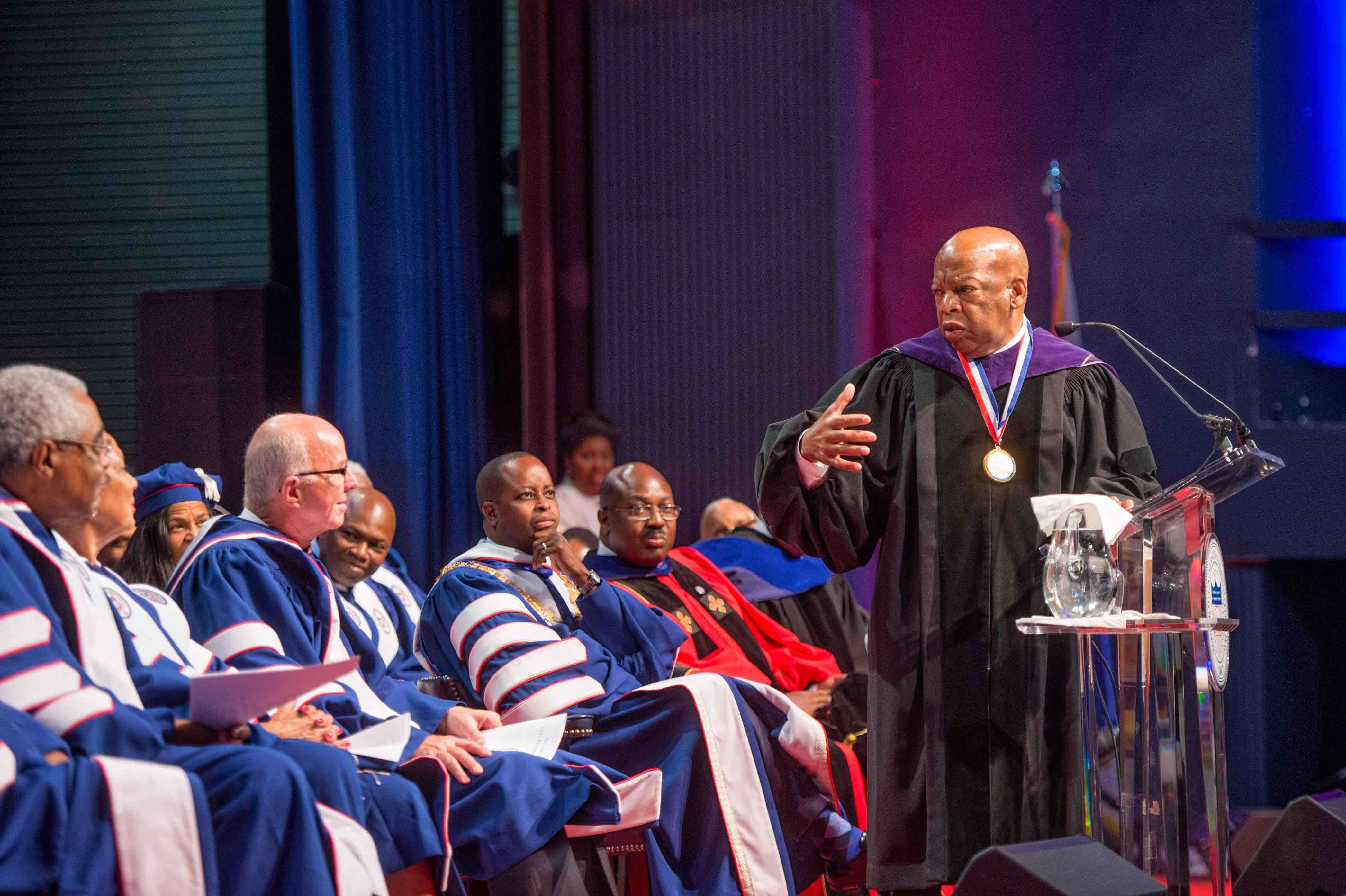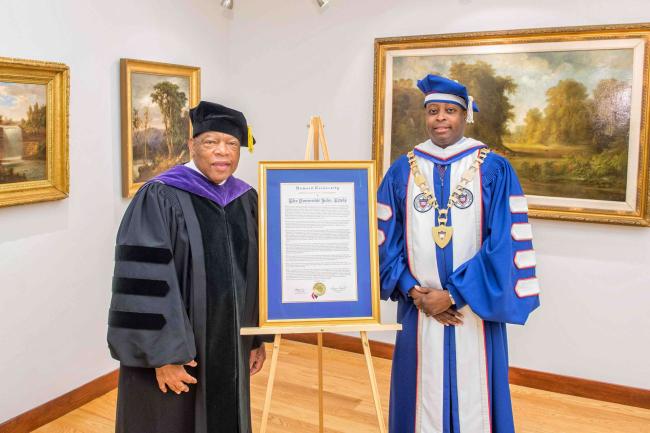Dear Howard University Community,
 Today, the Howard University community joins the country in mourning the loss of the legendary Civil Rights icon and Congressman John R. Lewis, who died Friday at the age of 80.
Today, the Howard University community joins the country in mourning the loss of the legendary Civil Rights icon and Congressman John R. Lewis, who died Friday at the age of 80.
We were blessed to host Congressman Lewis on campus as he delivered our 2015 Opening Convocation Addressto celebrate the beginning of the academic year with students, faculty, staff and guests. Congressman Lewis spoke of his experiences in the Civil Rights Movement in the 1960s, and urged students to create positive, non-violent change in America’s present-day civil rights landscape.
He addressed the audience with his signature “Good Trouble” call to action, saying: “I call on members of this university community to get out there [to] educate our young people, to inspire, to give people hope, to stand up… to get into trouble. Good trouble, necessary trouble. It is the power of the way of peace, of love, of non-violence.”
To the Class of 2019, he called upon the need for each to act as symbols of non-violent change. “If we do our part, our nation, our community will merge as a model and maybe it will serve as a symbol of hope for the rest of the world. Don’t give up, don’t become bitter, and with faith, hope and love, I wish you well during this new school year.”
Born on Feb. 21, 1940, Lewis was the third of 10 children of tenant farmers Eddie Lewis and the former Willie Mae Carter, raised outside of Troy, Alabama in the segregated South. As a boy, he was inspired to become an activist and join the burgeoning Civil Rights Movement after following news media coverage of historical events, including the Montgomery Bus Boycott and speeches by the Rev. Martin Luther King, Jr. This was the beginning of his rise to civil servant-hood and advocacy for equal opportunity and access for all citizens.
Lewis graduated from Fisk University with a degree in religion and philosophy. During his matriculation, he organized sit-in demonstrations at segregated lunch counters in Nashville, Tennessee. He also volunteered to become a Freedom Rider in 1961, during which he suffered multiple assaults and beatings by simply sitting in “whites only” sections of diners. Lewis was a founding member of the Student Nonviolent Coordinating Committee (SNCC), for which he later served as chairman and facilitated the groundswell of organized student activism within the movement.
John Lewis’ silent protest walk with other brave citizens over the Edmund Pettus Bridge on March 7, 1965, became known as Bloody Sunday. Together with the Southern Christian Leadership Conference’s Hosea Williams, Mr. Lewis led 600 people to the Edmund Pettus Bridge on the edge of Selma before meeting the resistance of police. That day, the Nation watched the televised reports of police in gas masks attacking unarmed men, women and children, many dressed in their Sunday’s best. Mr. Lewis’s endured a skull fracture in the attack and was hospitalized along with 77 other demonstrators. He would later define this event as the day that changed the course of his life. His selfless act of civil disobedience demonstrated his commitment to social justice, which remains steadfast in today’s political climate, upholding the standard for future generations.
Mr. Lewis was elected to the Atlanta City Council in 1982, and to Congress in November 1986. During his tenure, he has served diligently as U.S. representative of Georgia’s Fifth Congressional District. Lewis was an internationally revered civil servant, orator, lecturer, historian and author. Howard University proudly honored him with honorary degree in 2002, making him a true son of Howard and an exemplar of the University’s motto, Veritas et Utilitas (truth and service).
Congressman Lewis will forever live in our hearts a shining example of a life of service and how the use of civil disobedience can impact change in a world of inequity. Over the course of his lifetime, he was arrested at least 45 times, mostly during the civil rights movement of the 1960’s. However, he continued to use civil disobedience as a useful tool in his senior years, most recently in 2013 while advocating for immigration reform. As a lawmaker, he was never afraid to get in “good trouble” and be arrested while participating in protests.
Congressman Lewis was a giant of a man with impeccable integrity and impenetrable determination and love for humanity. An ideal for all of us to embody in our daily pursuit of a life of service. The work he started for social justice progressed significantly during his lifetime and the baton has been passed forward in a valiant way to a generation of youth who will carry on his legacy confidently. Rest well, Congressman Lewis. Rest well.
In Truth and Service,
Wayne A. I. Frederick, M.D., MBA
President





